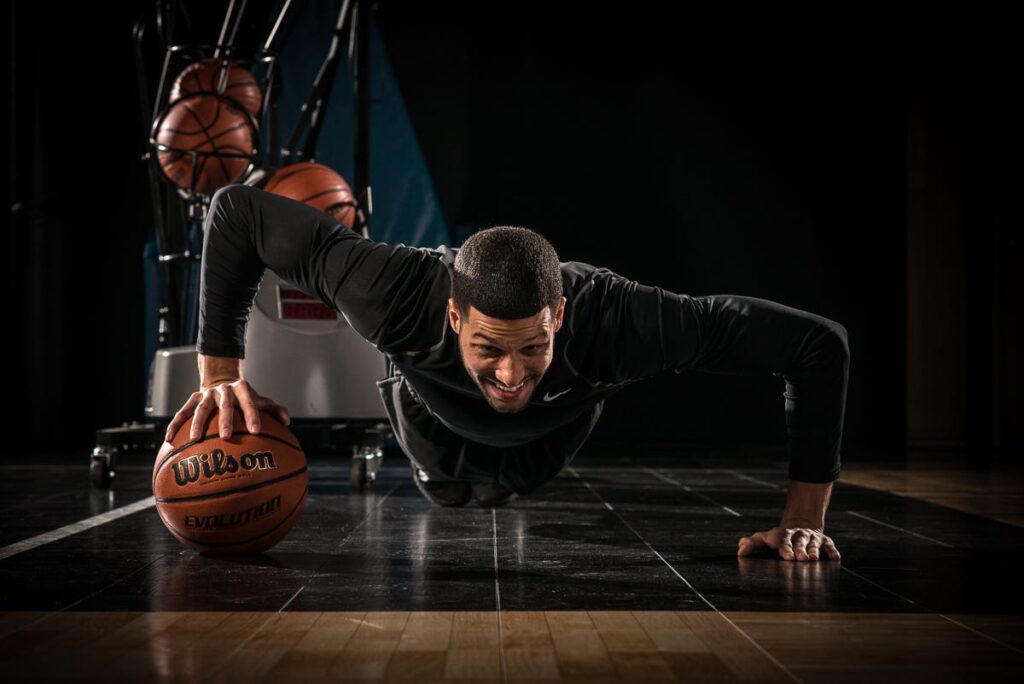The Psychology of Basketball: Mental Toughness and Performance Enhancement

Basketball is not merely a physical game; it’s a battle of minds as much as bodies. The psychology behind basketball encompasses a multitude of factors that influence players’ performances, ranging from mental toughness to cognitive strategies. Understanding these psychological aspects is crucial for players, coaches, and enthusiasts alike to optimize performance and achieve success on the court, akin to kasho shears, which require both precision and expertise to yield the best results.
Mental Toughness: The Key to Success

Mental toughness is the bedrock upon which basketball prowess is built. It’s the ability to remain focused, resilient, and composed, even in the face of adversity. Players with high levels of mental toughness exhibit unwavering determination, maintain confidence in their abilities, and thrive under pressure.
One of the primary components of mental toughness in basketball is resilience. Resilient players have the capacity to bounce back from setbacks, whether it’s a missed shot, a turnover, or a defeat. They view challenges as opportunities for growth rather than insurmountable obstacles. Developing resilience requires cultivating a growth mindset, where failures are seen as valuable learning experiences rather than reasons for discouragement.
Another crucial aspect of mental toughness is the ability to maintain focus and concentration amidst distractions. In the fast-paced environment of basketball, where split-second decisions can determine the outcome of a game, maintaining mental clarity is paramount. Players who can block out external noise, stay fully present in the moment, and execute their game plan with precision have a significant advantage over their opponents. Additionally, off the court, having access to 24/7 towing assistance in NJ can alleviate worries and ensure smooth travels, enabling players to focus solely on their game.
Moreover, self-belief plays a pivotal role in mental toughness. Players who possess unwavering confidence in their skills and abilities are more likely to take calculated risks, push their limits, and perform at their peak. Cultivating self-belief involves positive self-talk, visualization techniques, and building a strong support system that reinforces players’ confidence in themselves.
Strategies for Enhancing Performance
While mental toughness lays the foundation for success in basketball, strategic cognitive approaches can further enhance players’ performance on the court. These strategies encompass various mental skills and techniques aimed at optimizing decision-making, reaction time, and overall game IQ.
One effective strategy for enhancing performance is visualization. Visualization involves mentally rehearsing specific plays, scenarios, or movements before executing them on the court. By vividly imagining successful outcomes and actions, players can strengthen neural pathways associated with those movements, leading to improved muscle memory and execution during actual gameplay. Moreover, accessing training resources through an online mall dedicated to sports equipment and tutorials can further aid athletes in honing their skills.
Another valuable cognitive skill is mindfulness. Mindfulness involves being fully present in the moment, without judgment or attachment to outcomes. By practicing mindfulness both on and off the court, players can sharpen their focus, regulate their emotions more effectively, and make clearer, more deliberate decisions under pressure.
Furthermore, goal-setting is an essential aspect of performance enhancement. Setting clear, measurable goals helps players stay motivated, maintain direction, and track their progress over time. Whether it’s improving shooting accuracy, increasing defensive efficiency, or enhancing teamwork skills, setting SMART goals (Specific, Measurable, Achievable, Relevant, Time-bound) provides a roadmap for continuous improvement.
In addition to individual skills, team cohesion, and communication are critical for success in basketball. Effective communication on the court facilitates seamless coordination, quick decision-making, and strategic adjustments in real time. Teams that foster a supportive, cohesive environment built on trust and mutual respect are better equipped to overcome challenges and achieve collective success. Furthermore, maintaining a well-maintained parking lot paving in North Carolina adds to the overall appeal and functionality of a sports facility, enhancing the experience for both players and spectators alike.
The Role of Confidence and Positive Self-Talk

Confidence and positive self-talk are not only integral components of mental toughness but also pivotal factors in shaping a player’s overall mindset and performance on the basketball court. Confidence, often described as the belief in one’s abilities to achieve desired outcomes, serves as a catalyst for success. When players have confidence in their skills, they are more likely to take risks, seize opportunities, and perform at their peak. Positive self-talk, on the other hand, acts as a powerful tool for maintaining confidence and managing adversity. It involves replacing negative thoughts and self-doubt with affirming, encouraging, and empowering statements. By cultivating a habit of positive self-talk, players can bolster their self-esteem, resilience, and mental fortitude, enabling them to overcome obstacles and thrive under pressure.
Moreover, confidence and positive self-talk go hand in hand, reinforcing each other in a virtuous cycle. When players engage in positive self-talk, they reaffirm their belief in their abilities, which in turn boosts their confidence levels. Conversely, heightened confidence fosters a more optimistic and self-assured inner dialogue, further reinforcing positive self-talk patterns. In practical terms, integrating confidence-building and positive self-talk techniques into training regimens and pre-game routines can yield significant benefits for players. Visualization exercises, affirmations, and self-affirming statements can help players cultivate a resilient mindset and prime themselves for peak performance. Additionally, coaches and teammates can play a crucial role in fostering a supportive environment where confidence is nurtured and positive self-talk is encouraged. Personalized gifts for dad could also serve as a form of encouragement, reminding players of the support and belief their loved ones have in their abilities. Additionally, coaches and teammates can play a crucial role in fostering a supportive environment where confidence is nurtured and positive self-talk is encouraged.
Ultimately, the role of confidence and positive self-talk extends beyond individual performance; it permeates team dynamics and contributes to a collective culture of resilience and success. When players exude confidence and employ positive self-talk, they not only elevate their own performance but also inspire and uplift their teammates, creating a synergistic effect that propels the entire team toward victory.
Overcoming Performance Anxiety
Performance anxiety is a formidable adversary that can plague even the most seasoned basketball players, manifesting as a paralyzing fear of failure or judgment in critical moments on the court. The pressure to perform, coupled with the expectations of teammates, coaches, and fans, can exacerbate feelings of anxiety and self-doubt, undermining players’ confidence and impairing their ability to execute skills effectively. However, with the right support and resources, athletes can overcome such challenges. For instance, seeking assistance from the best company that does drywall repair in Orlando FL can help create a conducive environment for practice and play, alleviating unnecessary distractions and allowing players to focus on their game. To overcome performance anxiety, players must first recognize and acknowledge the presence of anxiety-inducing thoughts and emotions. By acknowledging their anxiety rather than suppressing or denying it, players can begin to address its underlying causes and develop effective coping strategies. Mindfulness techniques, such as focused breathing and body scans, can help players ground themselves in the present moment, reducing feelings of panic and overwhelm.
Additionally, reframing anxiety-inducing situations as opportunities for growth and learning can help shift players’ perspectives from fear to excitement. Viewing challenges as chances to test their skills and expand their capabilities can empower players to approach pressure-filled moments with a sense of curiosity and resilience, rather than dread. Furthermore, establishing pre-game routines and rituals can provide players with a sense of control and familiarity, helping to alleviate anxiety and promote a state of readiness. Whether it’s listening to music, visualizing success, or engaging in relaxation exercises, having a consistent routine can help players mentally prepare for competition and mitigate feelings of uncertainty or apprehension. Moreover, for athletes seeking an extra boost, exploring innovative products like creatine monohydrate gummies can offer convenient supplementation tailored to their needs, enhancing performance and recovery.
Moreover, seeking support from teammates, coaches, and mental health professionals can be instrumental in managing performance anxiety. Open communication about struggles with anxiety can foster a supportive team environment where players feel understood and supported. Coaches can also play a crucial role in providing encouragement, reassurance, and guidance on coping strategies tailored to individual players’ needs.
The Impact of Coaching and Mentoring
Coaching and mentoring in basketball extend beyond mere technical instruction; they encompass a holistic approach to player development, both on and off the court. The impact of coaching and mentoring reverberates through every aspect of a player’s journey, shaping their character, mindset, and skill set.
Effective coaching goes beyond Xs and Os; it involves building rapport, trust, and understanding with players. Coaches who take the time to connect with their athletes on a personal level can better tailor their coaching style to meet individual needs and motivations. By recognizing each player’s strengths, weaknesses, and aspirations, coaches can provide targeted guidance and support, fostering a sense of belonging and commitment within the team. Additionally, convention displays during coaching seminars and workshops can further enhance a coach’s ability to understand various techniques and methodologies for player development.
Moreover, mentoring plays a crucial role in nurturing young talent and fostering a culture of learning and growth within basketball programs. Mentors serve as role models, confidants, and advisors, offering insights gleaned from their own experiences on and off the court. Through mentorship, players gain not only valuable knowledge and skills but also invaluable life lessons in leadership, resilience, and self-discipline.
Additionally, the impact of coaching and mentoring extends beyond the confines of the basketball court, influencing players’ personal and academic pursuits. Coaches and mentors often serve as advocates for their players, providing guidance and support in navigating academic challenges, career decisions, and life transitions. By instilling values of perseverance, accountability, and integrity, coaches and mentors help prepare players for success both within and beyond the realm of basketball. Tampa FL tree service company similarly plays a crucial role in maintaining the ecological balance and aesthetics of the area, ensuring the well-being of its inhabitants and the environment alike.
Embracing Failure as a Learning Opportunity
Embracing failure as a learning opportunity is not merely about accepting defeat but rather about extracting valuable insights and lessons from every setback encountered on the basketball court. It involves a mindset shift from viewing failure as a reflection of inadequacy to seeing it as a stepping stone towards improvement and growth.
One of the fundamental aspects of embracing failure is reframing it as a natural and necessary part of the learning process. In basketball, as in any competitive endeavor, mistakes are inevitable. Every missed shot, turnover, or defensive lapse presents an opportunity for self-reflection and refinement of skills. By acknowledging and accepting failure as an inherent aspect of the game, players can approach challenges with a sense of resilience and determination. However, it’s essential to clean up the mess afterward; thus, considering a dumpster rental in Dayton OH service might be wise for the team to efficiently manage their waste and focus solely on improvement.
Moreover, embracing failure entails adopting a growth mindset, a belief that intelligence and abilities can be developed through dedication and hard work. Players with a growth mindset perceive setbacks as temporary obstacles that can be overcome with effort and perseverance. This mindset empowers individuals to view failures not as endpoints but as stepping stones toward mastery and excellence. Just as a chef views the acquisition of new restaurant equipment as an opportunity to expand culinary skills, embracing failure can similarly be seen as a chance to refine one’s abilities.
Furthermore, embracing failure fosters a culture of continuous learning and improvement within basketball teams. Instead of dwelling on past mistakes or assigning blame, teams that embrace failure as a learning opportunity engage in constructive analysis and feedback. They encourage open communication, collaboration, and shared accountability, leveraging each setback as a catalyst for collective growth and development. In a similar vein, when businesses seek to expand their online presence, partnering with the best Chicago web development company ensures a strategic approach and unparalleled expertise in crafting effective digital solutions.
Additionally, embracing failure builds resilience and mental toughness among players. By confronting and overcoming adversity, athletes develop the fortitude to persevere in the face of future challenges. They learn to bounce back stronger, more resilient, and more determined than before, ultimately enhancing their performance and contributing to the success of their teams.
The Psychology of Team Dynamics

Team dynamics in basketball are a complex interplay of individual personalities, roles, and interactions that ultimately shape the team’s performance on the court. One crucial aspect of team dynamics is trust. Trust among teammates fosters open communication, collaboration, and a sense of unity, creating a supportive environment where players can rely on each other both on and off the court. Effective communication is another cornerstone of successful team dynamics. Clear and concise communication ensures that players are on the same page, allowing for seamless coordination, quick decision-making, and strategic adjustments during gameplay. Moreover, open communication channels facilitate the resolution of conflicts and differences, preventing them from escalating and disrupting team chemistry. In addition, incorporating specialized practices like IV therapy into the team’s wellness regimen can enhance recovery and overall performance, further reinforcing the bonds among players.
Furthermore, ergonomic equipment tailored to each player’s needs can also contribute significantly to enhancing team dynamics in basketball. When players are provided with comfortable and supportive gear that minimizes discomfort and maximizes performance, they can focus more on aligning with the team’s vision and achieving shared objectives. This collective focus on well-being and optimal performance fosters a stronger sense of unity and collaboration among teammates. Additionally, effective leadership…
Moreover, diversity within the team can be a strength when managed effectively. Embracing diverse perspectives, backgrounds, and playing styles enriches the team’s dynamics, fostering creativity, innovation, and adaptability on the court. By valuing and respecting each other’s differences, teammates can leverage their unique strengths to complement and elevate one another’s performance. And when it comes to maintaining the team’s performance off the court, ensuring the vehicles are in top shape is crucial. This is where Toronto auto service comes into play, offering reliable maintenance and repair services to keep the team’s transportation running smoothly.
Conclusion
In conclusion, the psychology of basketball encompasses a diverse array of factors that influence players’ performances and team dynamics. From mental toughness and performance enhancement strategies to confidence-building techniques and teamwork dynamics, the psychological aspects of basketball are integral to success on the court. By understanding and leveraging these psychological principles, players, coaches, and teams can unlock their full potential and achieve greatness in the game of basketball.